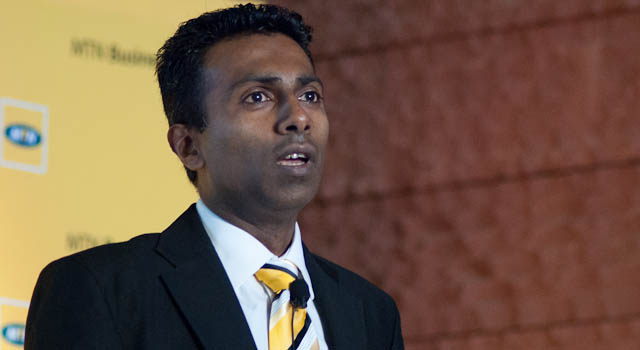
There is space in South Africa’s telecommunications industry for only two mobile infrastructure operators providing next-generation wireless broadband using 4G/LTE technology, a senior industry executive has said, but a top analyst is not convinced.
MTN’s chief enterprise business officer, Lambo Kanagaratnam, argues that two infrastructure players make sense in a market like South Africa’s and that other players could compete at the services level using the two networks.
Two 4G networks is the optimal arrangement to ensure quality service alongside sufficient competition in South Africa, according to Kanagaratnam, who was speaking during a debate chaired by TechCentral and hosted by Telkom in Stellenbosch on Monday.
“Scale is very important,” Kanagaratnam says. “One network is not enough; two does make sense.”
Pointing to other markets, Kanagaratnam said consolidation is allowing operators to reduce capital expenditure while maintaining quality of service. “Infrastructure should be about scale, while competition at the service level is really about innovation and getting as many people as possible to have access to that,” he says.
But World Wide Worx MD Arthur Goldstuck thinks placing limitations on the number of network providers is bad for consumers.
“I think any argument that tries to return us to a duopoly is a limiting position,” Goldstuck says. “It’s been shown that the presence of Telkom Mobile and Cell C — even though they’re struggling to compete on a profit level — has been very healthy for competition.”
When there are only two players, there are “higher profits to be made”. This is in the interest of investors, but not consumers.
“In an emerging market with a developmental agenda, it’s crucial to balance those concerns,” Goldstuck adds.
Kanagaratnam argues that by minimising the number of 4G operators, those that build networks will get access to more radio frequency spectrum, allowing them to build robust and fast networks.
“Whether you look at [infrastructure] investment or spectrum, everything lends itself to scale,” he says. “The services level is where competition happens.”
What about possible collusion with only two players in the market? Kanagaratnam says various models can be considered to prevent this. South African legislation “prevents people collaborating” because of the “hurdles” operators have to overcome if they want to talk to one another and collaborate. This, he says, is hurting local industry and results in operators duplicating infrastructure they could just as easily share. — (c) 2013 NewsCentral Media




